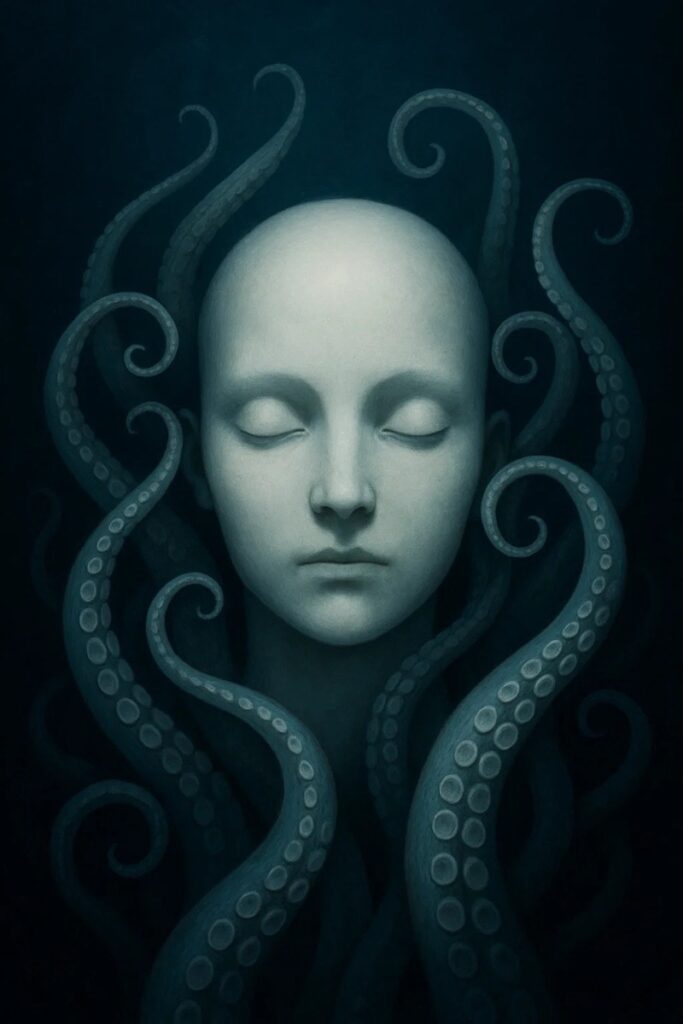It waits at the lane’s end, looming with the sun behind it, its long shadow reaching towards the first houses. Always, it waits at the same spot. Hunched, folded into itself, uncountable limbs looped in ways that the eye insists must break bones—if bones were in there to be broken.
It just is.
They know it.
It knows them.
No one names it. No one dares.
They measure their lives by its arrivals. These don’t come regularly. There’s no markings on a calendar to tell of its visits. They just know that it wasn’t always, and that it will always be. They measure themselves against the groan of weary shutters and straining beams when it settles its weight against the village. Children stop their play to listen. The dogs fall silent. Chickens retreat to their roosts and the town’s cats? They’re nowhere to be seen.
When it leans close, when it stalks their lanes and alleys in the hour after the sun passes from the skies, there is an easing.
For a time, things brighten. Breathing is deeper and cleaner. The smith hammers lighter, less strain, better aim. The grocer remembers to smile, handing sun-ripe plums to children sticky-fingered with stolen sugar. The priest raises his voice in sermon and praise and almost convinces himself that he means every word he preaches.
The air itself seems less sour, less heavy.
While it’s welcome, when it comes, the easing never lasts.
The cracks return, in time, and with them comes the village’s usual tenor, what has become its default tone.
The baker’s apprentice burns another loaf. The baker’s hand is quick and hard, the slap sharper this time. The boy hides his tears, or at least lies to himself that he does. That night, he wakes and slices the baker’s boots into ribbons, tosses his socks into the midden. In the morning, the baker rages barefoot across the stones. His curses hang in the air like incense, thick and cloying.
The villagers? They laugh.
At him. Not with him.
He’s not laughing.
The priest’s wife accuses the grocer’s son of theft. She has always distrusted his family. She spits in his mother’s face. His mother spits back. The missing coin turns up days later, disappearing into the priest’s pocket.
She deserves it, right? Why shouldn’t she have a little something for herself for once?
The carpenter blames his door for sticking. He blames the forest. He blames his wife’s nagging, the weather, the years, his old master, dead these last fifteen long years. When his dog whines at him, he kicks it. The dog leaves and does not return. Why would it?
The silence it leaves behind is louder than barking ever was.
They remember the before-times. They don’t talk about them other than in whispers, but they do remember.
Their fathers told them of days when the village was like any other—market days bright with voices, weddings loud with bells, laughter spilling like wine. Before the thing came. Before it leaned its weight against them and drank from them..
Other towns have stayed that way. When they send a messenger beyond the valley, he returns with reports of joy. Of neighbors who forgive. Of arguments that end in reconciliation instead of rot.
But those towns do not welcome them. Since the thing came, it’s like they carry its darkness with them, wherever they go.
The messengers return with other news too: the villagers are tainted. Touched. Twisted by whatever dwells at the lane’s end. No one will marry into their families. No one will take their trade. Their very presence at another village’s well is treated like poison poured into the bucket.
They know it should not be this way.
They know there’s nowhere else to go.
Each grudge lasts longer than the easing. Each wound festers sweeter.
The villagers are vessels, refilled by the only thing they now know: bitterness and taint. Old arguments resurface. Quarrels long buried claw their way back into daylight. They dig them up willingly, polishing them, turning them over like prayer stones in their hands.
It is easier than forgiving.
Forgiveness isn’t in them any more. They know only how to fill that void with bile.
That’s what the thing at the lane drinks from them.
It does not consume wheat or water. It does not hunger for meat. It takes the acrid taste of argument, the rancid oil of envy, the sharp copper tang of bruises blooming under skin. Every whispered insult is an litany. Every clenched fist, a sacrifice.
Every blow? A sacrament.
Once, years ago, the villagers tried kindness. They thought to starve it. They smiled when they did not mean it. They prayed together and sang as if the sound alone could drive it away.
The thing waited.
It did not leave.
Their kindness curdled within weeks, soured into resentment that burned hotter than ever. They spat harder for having swallowed sweetness too long. They struck deeper for having stayed their hands.
When the thing leaned again, it pulsed brighter than before. Its ribs gleamed wet in the dark.
They understood the lesson.
Now, they no longer resist.
A few have even learned to welcome it.
The widow sits at her window and whispers her grievances aloud, even when no one is there to hear. She savors her bitterness, proud to offer it up, proud to feel the thing stir outside.
The baker’s boy, now grown, holds on to every strike of his master’s hand, repeating each one in his memory like a catechism, until they become holy to him, the bitterness of his belief..
The priest, when he kneels at night, does not pray for salvation. He prays to be seen, to be tasted, to be taken into the bright, wet light of its sight.
They all know it will never go hungry here.
In the quiet moments, each one of them feels the same thought coil cold in their hearts:
Better to be food than forgotten.
